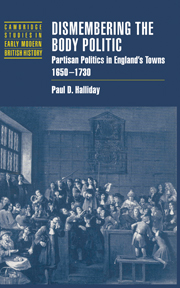Book contents
- Frontmatter
- Contents
- Preface
- List of abbreviations
- Part one Corporate ideal and partisan reality
- Part two The King and his corporations, 1660–1688
- 5 The corporations and their charters, 1660–1682
- 6 Quo warranto and the King's corporations, 1682–1685
- 7 Revolution in the corporations, 1685–1688
- Part three Partisan conflict and the law in a dynamic society
- Appendix A Royal charters of incorporation, 1660–1727
- Appendix B Enforcement of the Corporation Act, 1662–1663
- Select bibliography
- Index
- Titles in the series
7 - Revolution in the corporations, 1685–1688
Published online by Cambridge University Press: 10 November 2009
- Frontmatter
- Contents
- Preface
- List of abbreviations
- Part one Corporate ideal and partisan reality
- Part two The King and his corporations, 1660–1688
- 5 The corporations and their charters, 1660–1682
- 6 Quo warranto and the King's corporations, 1682–1685
- 7 Revolution in the corporations, 1685–1688
- Part three Partisan conflict and the law in a dynamic society
- Appendix A Royal charters of incorporation, 1660–1727
- Appendix B Enforcement of the Corporation Act, 1662–1663
- Select bibliography
- Index
- Titles in the series
Summary
Berwick endured a more painful reincorporation than most. Military leaders in that strategic border town, eager to enforce the laws against dissent with more severity, had long sought to control the corporation. Hopes of doing so by a quo warranto or a commission of association in 1681 and 1683 had come to nothing. But by October 1684, it looked as if local garrison commanders had won over enough of the corporation to gain their ends, though many still resisted, as Chief Justice Jeffreys learned from his informants there: “[They are] resolved to stand trial with the King about their charter; but forty-five of the most loyal of them will by Colonel Widdrington, our lieutenant governor, petition your Lordship to speak with his majesty that since they have always protested against and opposed the factious party, they may not be involved in the common name.” To help “the loyal party,” the attorney general served quo warranto to compel the intransigent to join them in surrender. Still, a majority voted defiance; these “dissenters” then prepared to answer the King's information, taking counsel with none other than London's lawyer, Henry Pollexfen. But he and John Holt, another prominent lawyer, advised conceding their charter as it would certainly be lost by the quo warranto, with worse consequences. Again the corporation voted, now capitulating by a majority of six.
The mayor lay the charter at Charles's feet and kissed his hand on January 23, 1685.
- Type
- Chapter
- Information
- Dismembering the Body PoliticPartisan Politics in England's Towns, 1650–1730, pp. 237 - 262Publisher: Cambridge University PressPrint publication year: 1998



